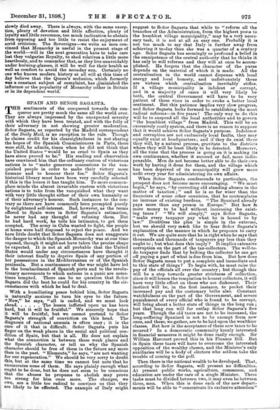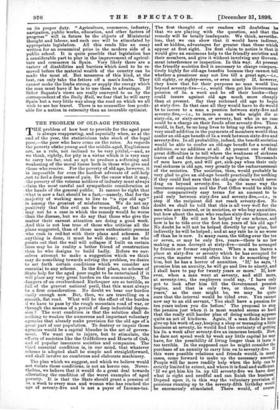SPAIN AND SENOR SAGASTA. T HE sentiments of the conquered towards
the con- queror are pretty much the same all the world over. They are always impressed by the unexpected severity with which they have been treated, and with the folly of their adversary in not showing greater moderation. Senor Sagasta, as reported by the Madrid correspondent of the Daily Mail, is no exception to the rule. Though he claims credit for his clearsightedness in not sharing the hopes of the Spanish Commissioners in Paris, there were still, he admits, times when he did not think that the United States "would be so cruel to Spain as they have since proved to be." His reading and observation have convinced him that the ordinary custom of victorious nations is to "make generous concessions to the van- quished people in order to make their victory more humane and to honour their foe." Senor Sagasta's historical library must have been very carefully selected if this is the lesson it has taught him. To more common- place minds the almost invariable custom with victorious nations is to take from the vanquished what they want with very little thought either of their own humanity or of their adversary's honour. Such instances to the con- trary as there are have commonly been prompted purely by enlightened self-interest. Bad, however, as the terms offered to Spain were in Senor Sagasta's estimation, he never had any thought of refusing them. But he had hard work, he tells his intimates, to get them accepted. The army in Cuba wanted to fight, the people at home were half disposed to reject the peace. And we have little doubt that Senor Sagasta does not exaggerate the danger to which the Spanish Monarchy was at one time exposed, though it might not have taken the precise shape he expected. It is not at all probable that the United States would under any circumstances have thought it their interest finally to deprive Spain of any portion of her possessions in the Mediterranean or of the Spanish peninsula. But a continuance of the war might have led to the bombardment of Spanish ports and to the revolu- tionary movements to which nations in a panic are some- times tempted. There can be no question that Senor Sagasta did the best he could for his country in the cir- cumstances with which he had to deal.
With a humiliating peace behind him, Senor Sagasta is naturally anxious to turn his eyes to the future. "Now," he says, "all is ended, and we must look ahead. . . . . . The lesson inflicted upon us has been hard, but it will be fruitful." We sincerely hope that it will be fruitful, but we cannot pretend to Senor Sagasta's strength of conviction on this head. The diagnosis of national anaemia is often easy ; it is the cure of it that is difficult. Senor Sagasta puts his finger on the weak places in the social and political con- dition of Spain, but that is all. He does not explain what the connection is between these weak places and the Spanish character, or tell us why the Spanish character should be free of them in the future any more than in the past. "Elements." he says, "are not wanting for our regeneration." We should be very sorry to doubt this, but at the same time we cannot but note that he enumerates none of them. He says plainly enough what ought to be done, but he does not seem to be conscious that the abuses he proposes to abolish may prove too strong for him once more. The changes, we own, are a little too radical to convince us that they are likely to be effected. The example of Italy might suggest to Senor Sagasta that while to "reform all the branches of the Administration, from the highest posts to the humblest village municipality," may be a very neces- sary task, it is not at all an easy one. Probably it is not too much to say that Italy is further away from achieving it to-day than she was a quarter of a century ago. Senor Sagasta has seemingly so profound a belief in the omnipotence of the central authority that he thinks it has only to will reforms and they will at once be accom- plished. He forgets that the character of the purse depends on the material of which it is made. All the centralisation in the world cannot dispense with local energy and local honesty, and unfortunately these are virtues which centralisation inevitably stifles. If a village municipality is indolent or corrupt, i and n a majority of cases it will very likely be both, the central Government will have to be very patient of these vices in order to evoke a better local sentiment. But this patience implies very slow progress, and Sefior Sagasta looks forward to establishing the most radical reforms—in five years ! The only way to do this will be to suspend all the local authorities and to govern "the humblest village" from Madrid. This will be an excessively costly system, and there is no reason to suppose that it would achieve Senor Sagasta's purpose. Indolence and corruption are not exclusively local faults, they may equally exist at headquarters ; and if they do exist there they will, by a natural process, gravitate to the districts where they will be least likely to be detected. Moreover, all the time that the process is going on it is making its own continuance, whether it succeed or fail, more indis- pensable. Men do not become better able to do their own work by having it done for them, and the village which has been deprived of its municipality will grow more unfit every year for administering its own affairs.
When Senor Sagasta condescends to particulars, the prospect does not become more encouraging. " We must begin," he says, "by correcting old standing abuses in the matter of taxation ; " and he is so far wiser than the financiers of some other countries, that he contemplates no increase of existing burdens. "The Spaniard already pays more than any person in Europe." But how N more money to be had without increasing the exist- ing taxes ? "We will simply," says Senor Sagasta, "make every taxpayer pay what he is bound to by law." Doubtless the plan is simple in the extreme, but we should very mach like to hear Sefior Sagasta's explanation of the manner in which he proposes to carry it out. We are quite sure that he is right when he says that thousands and thousands of taxpayers pay less than they ought to ; but what does this imply ? It implies extensive corruption on the part of the tax-collectors. The well-to- do taxpayer finds that by bribing the collector he can get off paying a part of what is due from him. But how does Senor Sagasta mean to put a complete and immediate end to this state of things ? To begin with, he must raise the pay of the officials all over the country ; but though this will be a step towards greater strictness of collection, since it will lessen the temptation to honest collectors, it will have very little effect on those who are dishonest. Their instinct will be, in the first instance, to pocket their increased pay and the customary bribe also. Constant watchfulness on the part of the Government, and severe punishment of every official who is found to be corrupt, will bring about a better state of things in the long run ; but that long run will far outlap Seilor Sagasta's five years. Though the old taxes are not to be increased, the long-suffering Spaniard is not to be exempt from new ones, and these, we gather, are to be laid upon the wealthier classes. But how is the acceptance of these new taxes to be secured ? In a democratic community keenly interested in financial measures it might be done easily enough. Sir William Harcourt proved this in his Finance Bill. But in Spain these taxes will have to overcome the interested opposition of the wealthy classes, and the Minister's only auxiliaries will be a body of electors who seldom take the trouble of coming to the poll.
Then there is the national wealth to be developed. That, according to Selior Sagasta, will present no difficulties. At present public works, agriculture, commerce, and education are under the care of a single Minister. These tasks must be divided between two, it may even be between three, men. When this is done each of the new depart- ments will be able to "concentrate its exclusive attention" on its proper duty. "Agriculture, commerce, industry, navigation, public works, education, and other factors of progress" will in future be the objects of Ministerial thought and labour, and each one will be stimulated by appropriate legislation. All this reads like an essay written for an economical prize in the modern side of a public school. It is quite possible that legislation has a considerable part to play in the improvement of agricul- ture and commerce in Spain. Very likely there are a variety of disabilities and barriers which need to be re- moved before the material wealth of the country can be made the most of. But measures of this kind, at the best, can only take the fetters off a man's limbs. They cannot make the limbs strong, or supply the energy which the man must have if he is to use them to advantage. If Seiler Sagasta's views are really conveyed to us by the correspondent of the Daily Mail, we fear that he will carry Spain but a very little way along the road on which we all wish to see her travel. There is no counsellor less profit- able for a nation in extremity than an incurable optimist.



































 Previous page
Previous page